What is Yasai Itame?
Yasai Itame (野菜炒め) is a simple Japanese stir fry dish made with vegetables and meat. The full name is actually “niku no yasai itame” which when translated, literally means meat (肉 – niku) and vegetable (野菜 – yasai) stir fry (炒め – itame).
The vegetables are actually the main ingredient in this dish, and because of this, it’s more commonly known as “yasai itame” or “vegetable stir fry”. However, this can be a little misleading as the dish nearly always contains meat, most commonly, thinly sliced pork.
The point to make here is that the pork is not the star ingredient, and you could easily substitute it for something else or omit it completely.
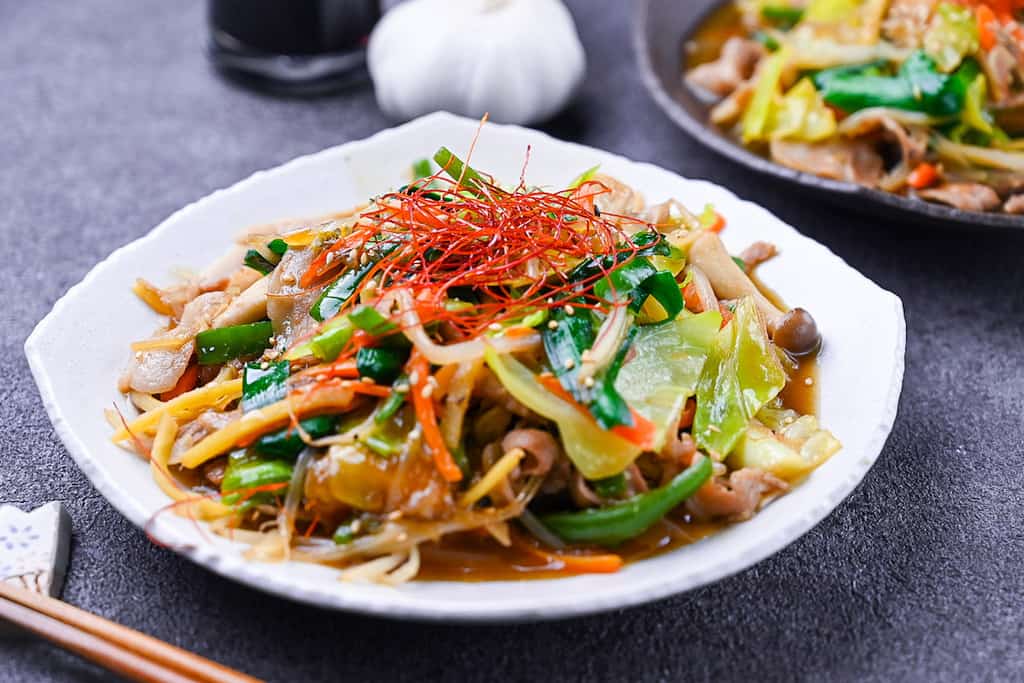
Ingredients & Substitution Ideas
- Thinly Sliced Pork Belly: Feel free to substitute with other pork cuts, chicken, or beef as preferred.
- Portherbs: Garlic and ginger are essential for adding depth and aroma to the dish.
- Vegetables: A colorful and nutritious mix including carrot, yellow onion, shimeji mushrooms, green cabbage, bell pepper, beansprouts, and garlic chives.
- Sauce Ingredients: Combine Chinese-style chicken bouillon powder with warm or hot water, oyster sauce, soy sauce, salt, and sugar. Thicken the sauce with a slurry of cold water mixed with starch.
- Toppings: Finish the dish with a drizzle of sesame oil, a sprinkle of white sesame seeds, and chili threads for a mild heat and an attractive presentation.
The beauty of stir-fry dishes is the fact you can customize them easily! Here are a few ideas for additional ingredients and substitutions.
- Pak choi
- Chinese cabbage (napa cabbage)
- Shiitake mushrooms
- Wood ear mushrooms
- Bell peppers
- Tenderstem brocolli
- Baby corn
- Bacon
- Firm tofu
To make this dish vegetarian, you’ll need to substitute chicken stock for vegetable stock or something similar, oyster sauce for “vegetarian oyster sauce” (usually made with mushrooms) and omit the meat.
There are no rules so feel free to use any stir fry vegetables that are easily accessible to you!
One thing to note: Be careful when adding vegetables with a high water content since they can make the dish soggy.
Jump to Full Recipe Measurements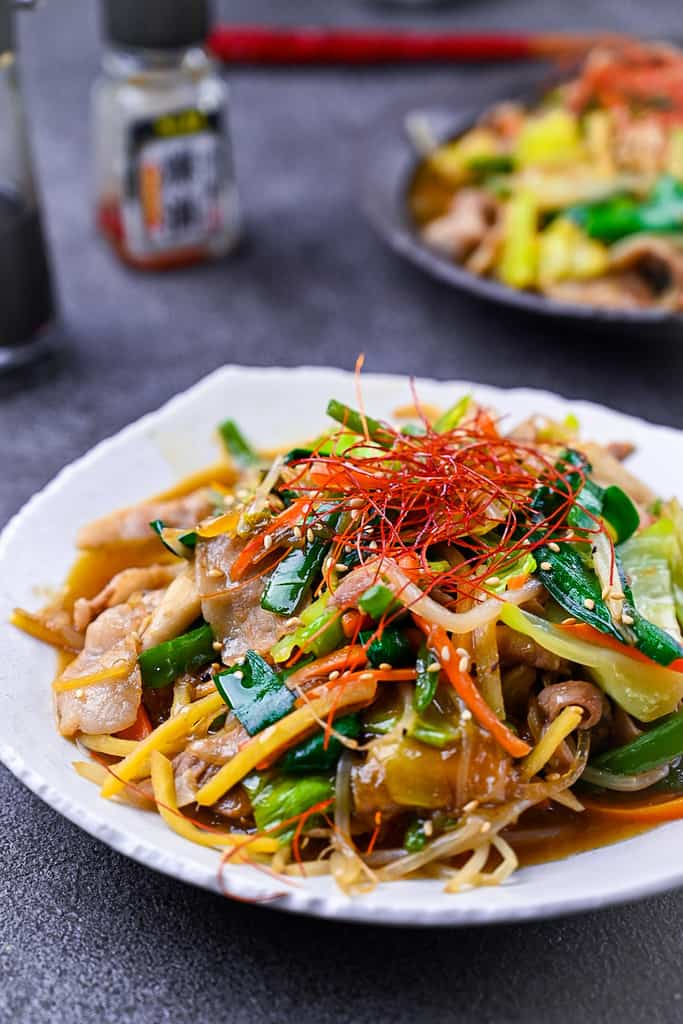
Visual Walkthrough & Tips
Here are my step-by-step instructions for how to make Yasai Itame at home. For ingredient quantities and simplified instructions, scroll down for the Printable Recipe Card below.
The first step is to measure out all of your ingredients and cut them according to the picture below. Generally, the vegetables should be cut small and thin to minimize cooking time. This applies to carrots and onions especially since they take longer to cook.
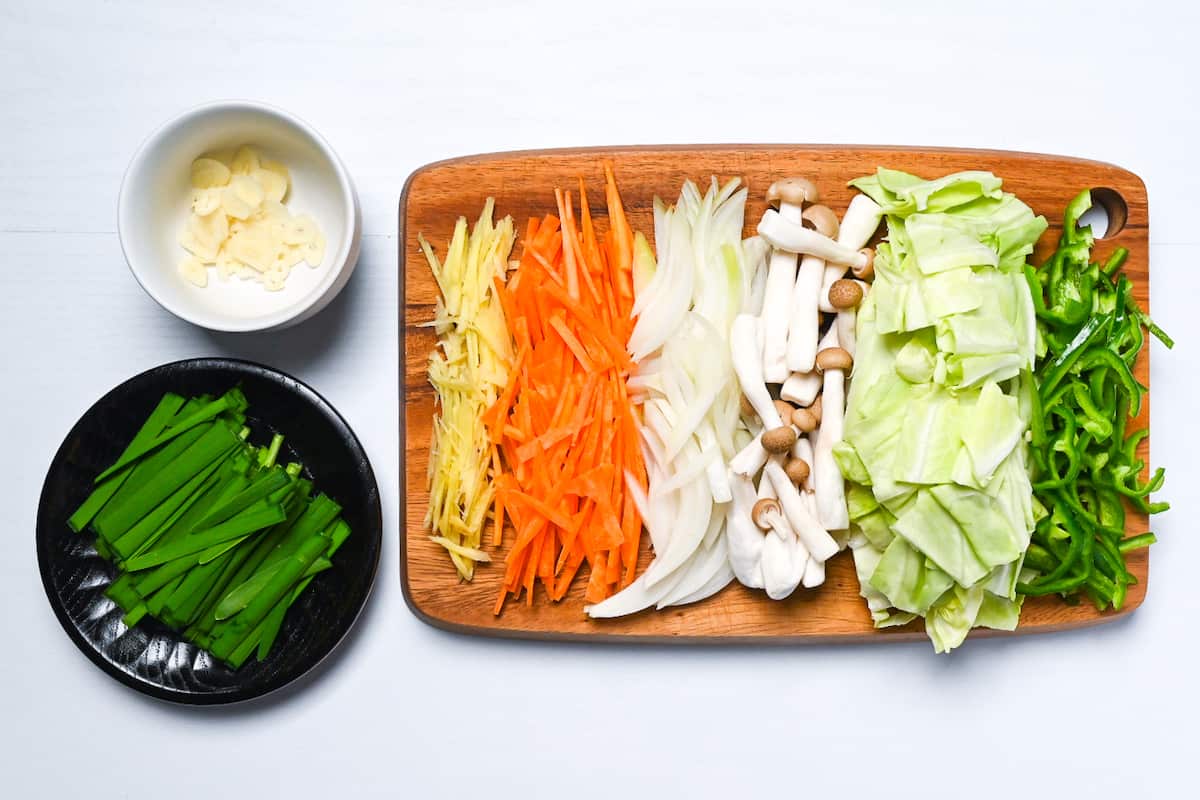
Here is a list on how I cut my vegetables for the quickest cooking time:
- Garlic – thinly sliced
- Chinese chives – cut into 5cm pieces
- Fresh ginger – peeled and julienned
- Carrot – peeled and julienned
- Onion – thinly sliced
- Shimeji mushrooms – whole
- Cabbage – roughly cut bitesize pieces
- Piman/bell pepper – thinly sliced
- Beansprouts (not pictured) – whole
If all your vegetables are cut in all different shapes and sizes, some might quickly become overcooked while others remain raw.
It’s important to cut the hard vegetables (like carrots) small and the softer vegetables (like cabbage) bigger so they cook at a similar time. This way, you can avoid burnt or watery/soggy vegetables in your stir fry!
Once all your ingredients are ready, heat a wok on medium and add a drizzle of oil. Once it’s hot, add the pork and sprinkle with salt and pepper. Add the garlic slices and fry them together until the pork is sealed.
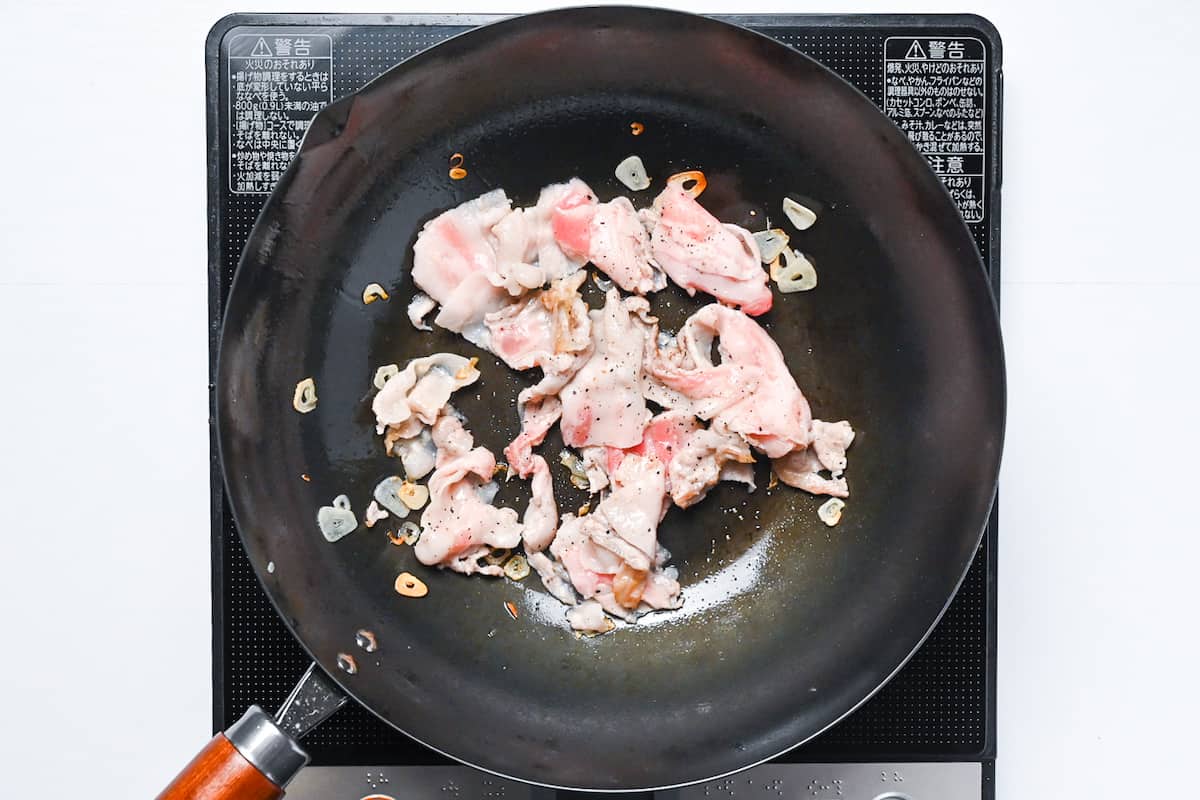
When it comes to yasai itame, we tend to think of frying quickly with high heat. However, stir-frying vegetables at once with high heat at home can break down the vegetables’ cells and draw out their water content, especially in regular frying pans.
Frying over medium heat is a safe option at home.
Next, I add the vegetables according to the cooking time. Ginger, carrot, onion and mushroom go first.
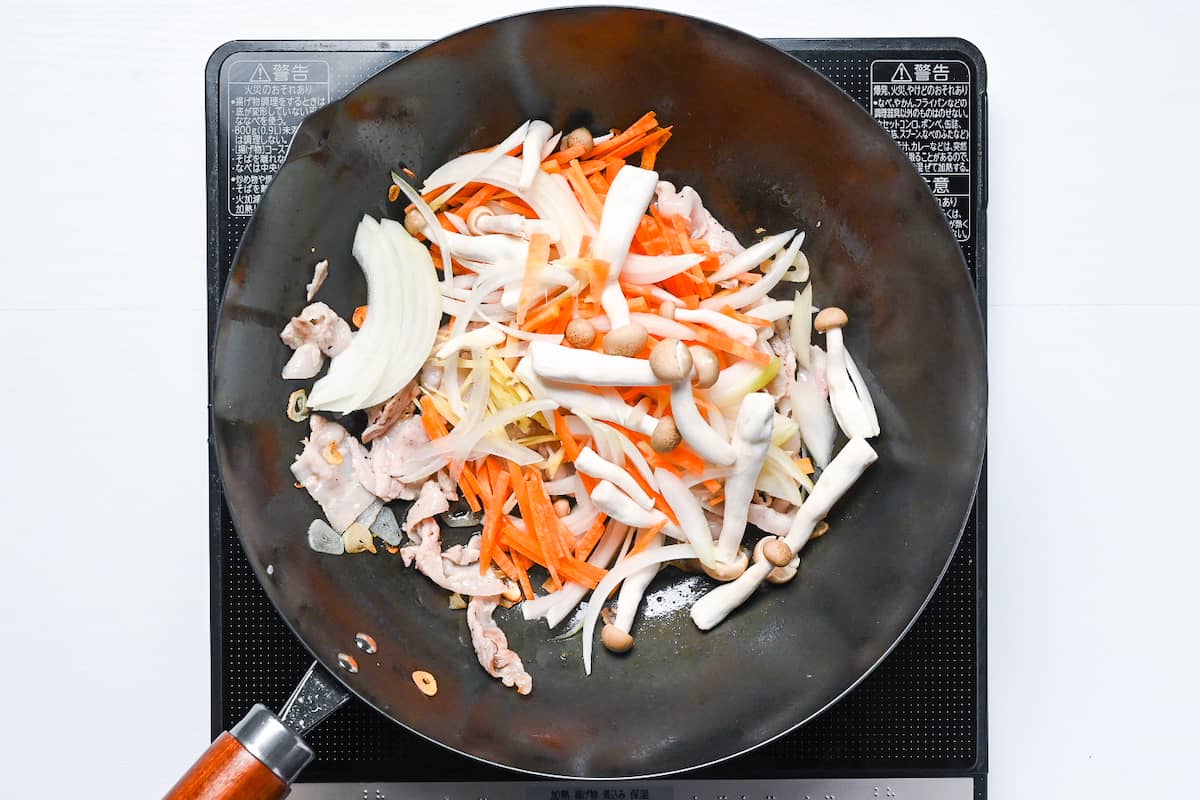
Add the cabbage and bell pepper once the carrot and onion are softened slightly. Stir fry for about 1-2 minutes.
Adding things like carrots and onions to the pan first is good because they require a bit more cooking time. I also add mushrooms quite early on so that they release more umami to the dish.
Things like cabbage and beansprouts only need a short cooking time otherwise, they become watery, so I tend to add them last.
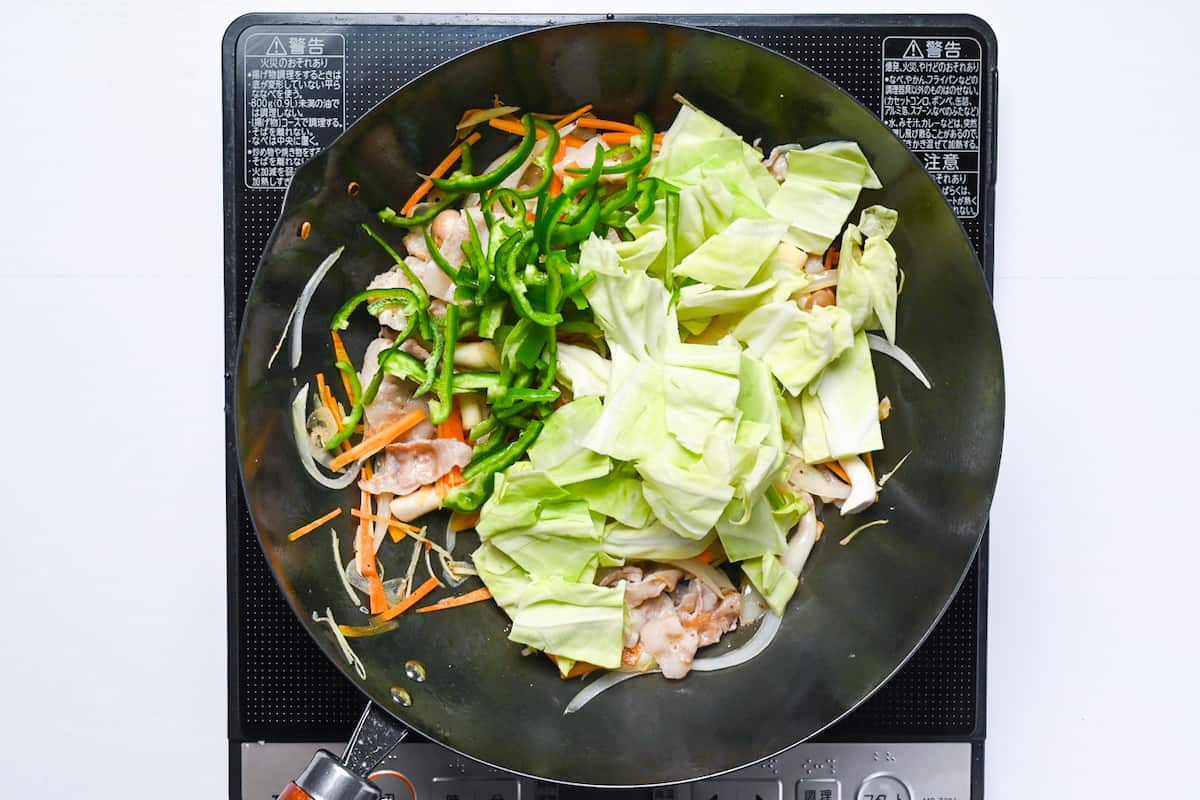
Add the beansprouts and stir fry for one more minute.
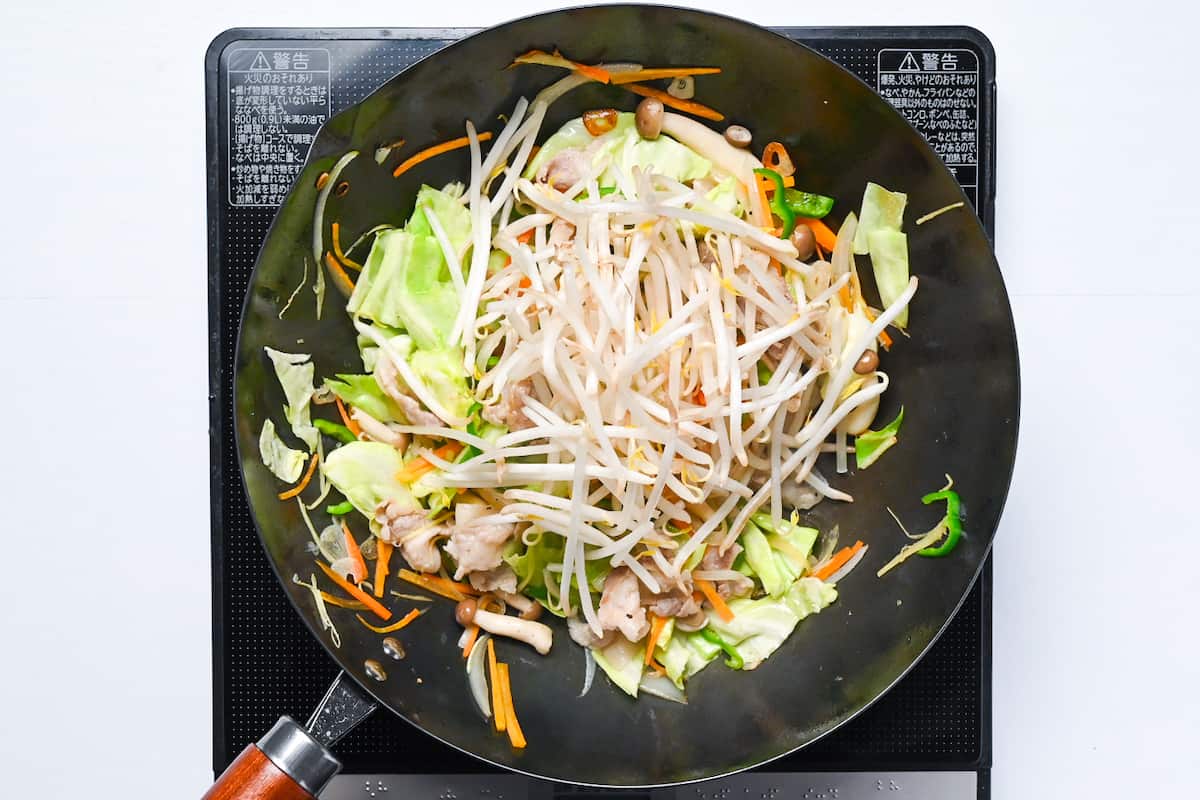
Yasai itame is a quick and easy dish that uses a variety of vegetables, but if you just throw everything in the wok at once without any thought, the ingredients will release water and start to steam, creating a soggy stir fry.
This ties in with timing, but frying the vegetables at different times is the best way to avoid this. It’s also a good idea to fry the watery ingredients (like cabbage) for a short time on a high heat so that they cook faster and have less time to release too much water.
Next, add the chicken stock, oyster sauce, soy sauce, salt and sugar.
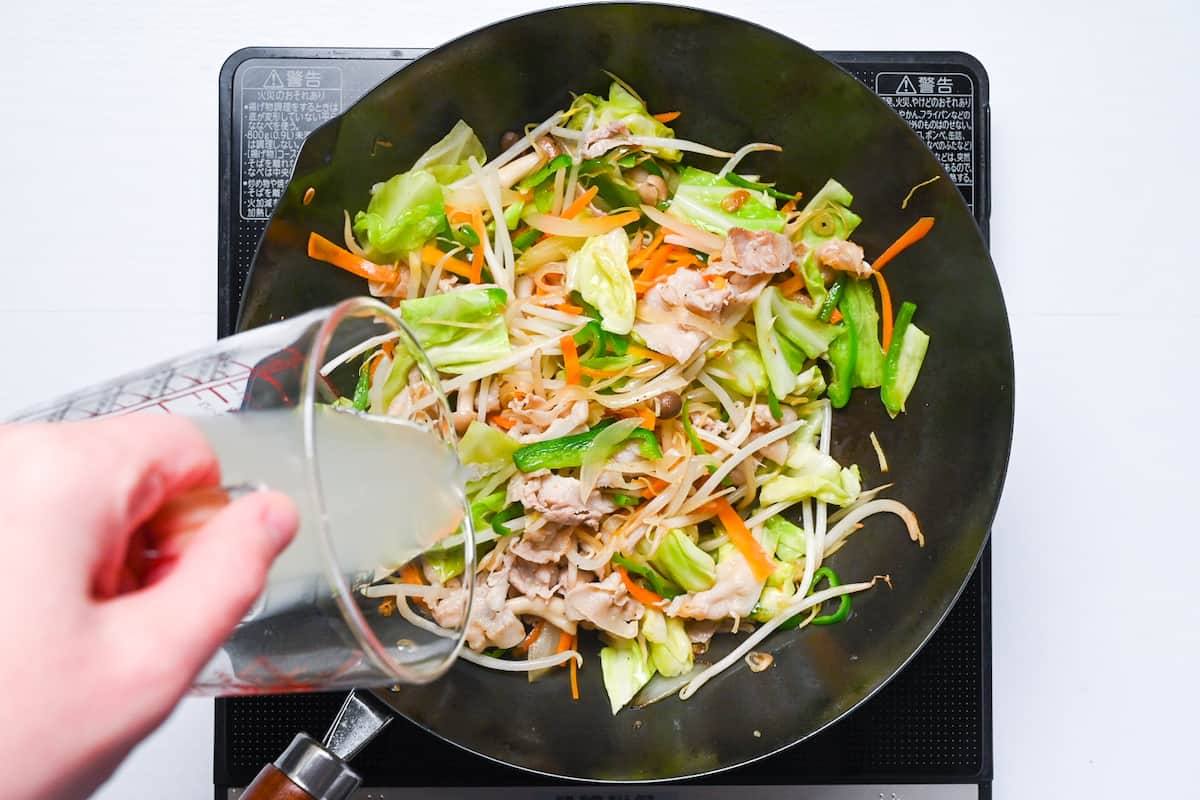
Mix thoroughly and then add the Chinese chives.
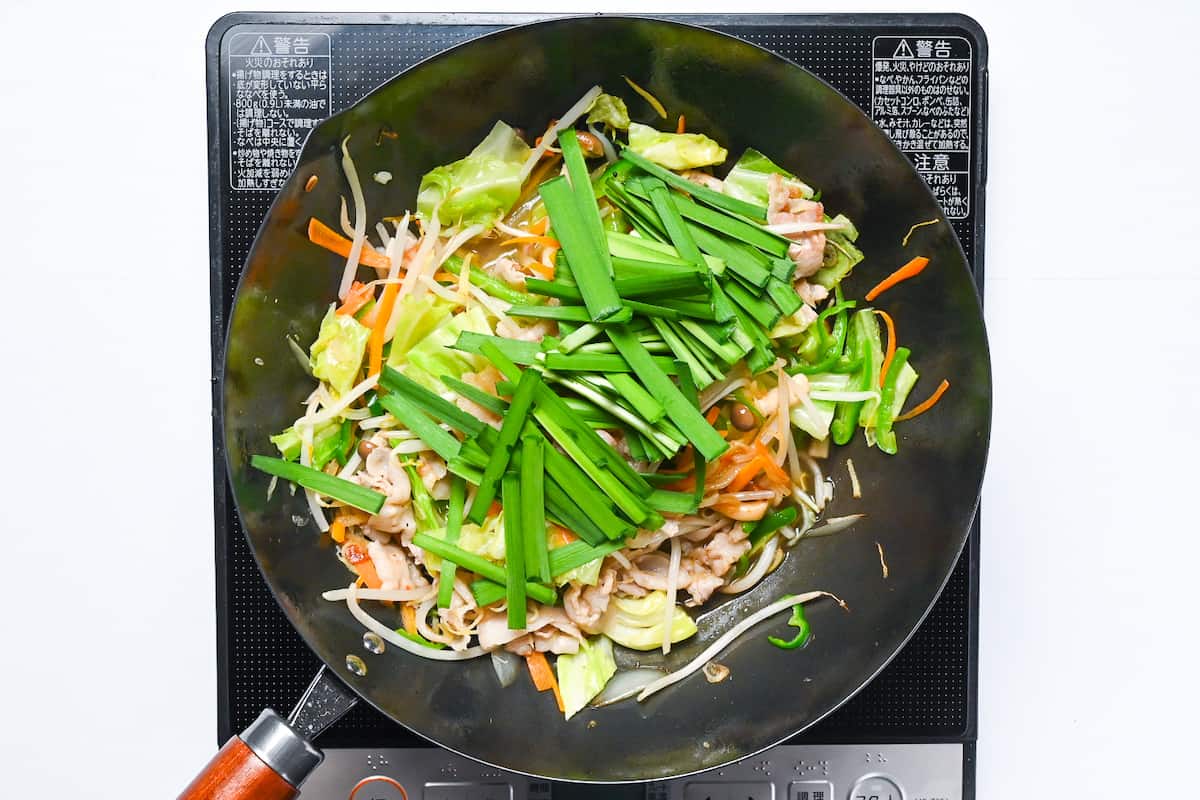
Mix 1 tbsp of cold water with 1 tbsp of potato starch in a small bowl. This is a slurry that will make your sauce thick and glossy.
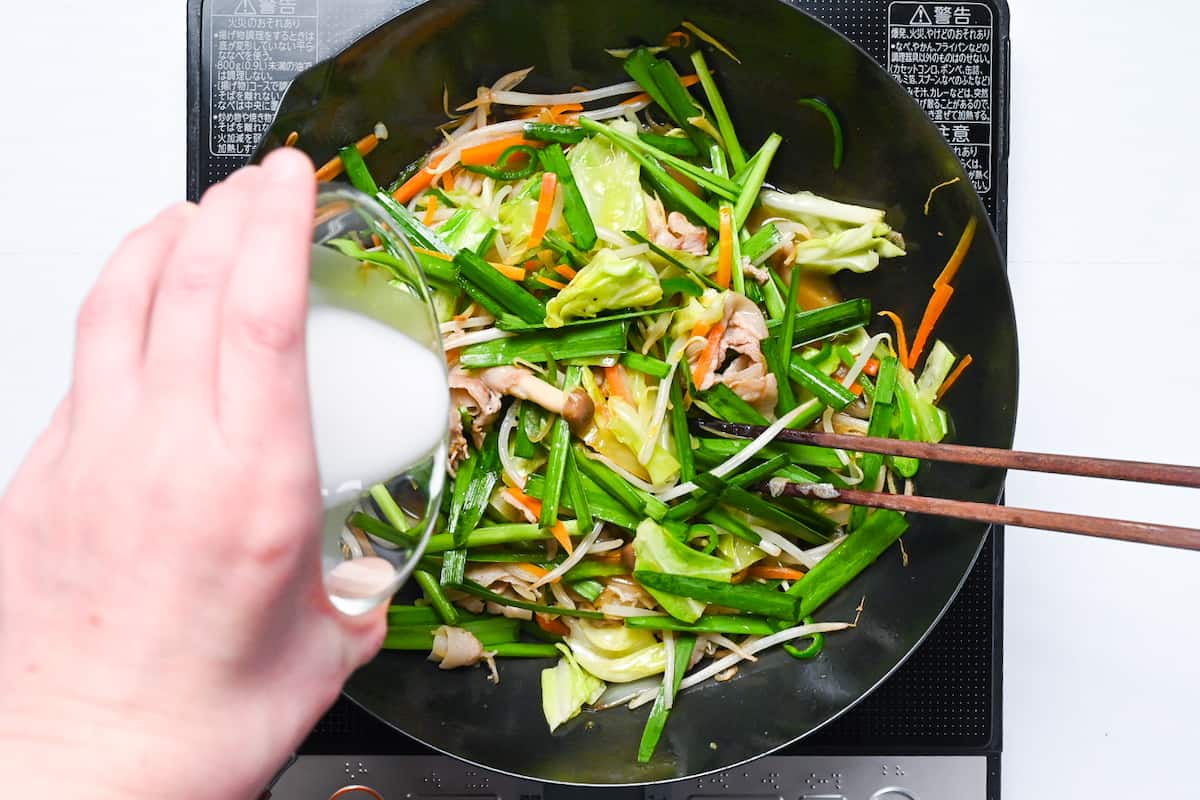
Continue to stir fry over medium heat until the sauce has thickened. This should only take a few minutes.
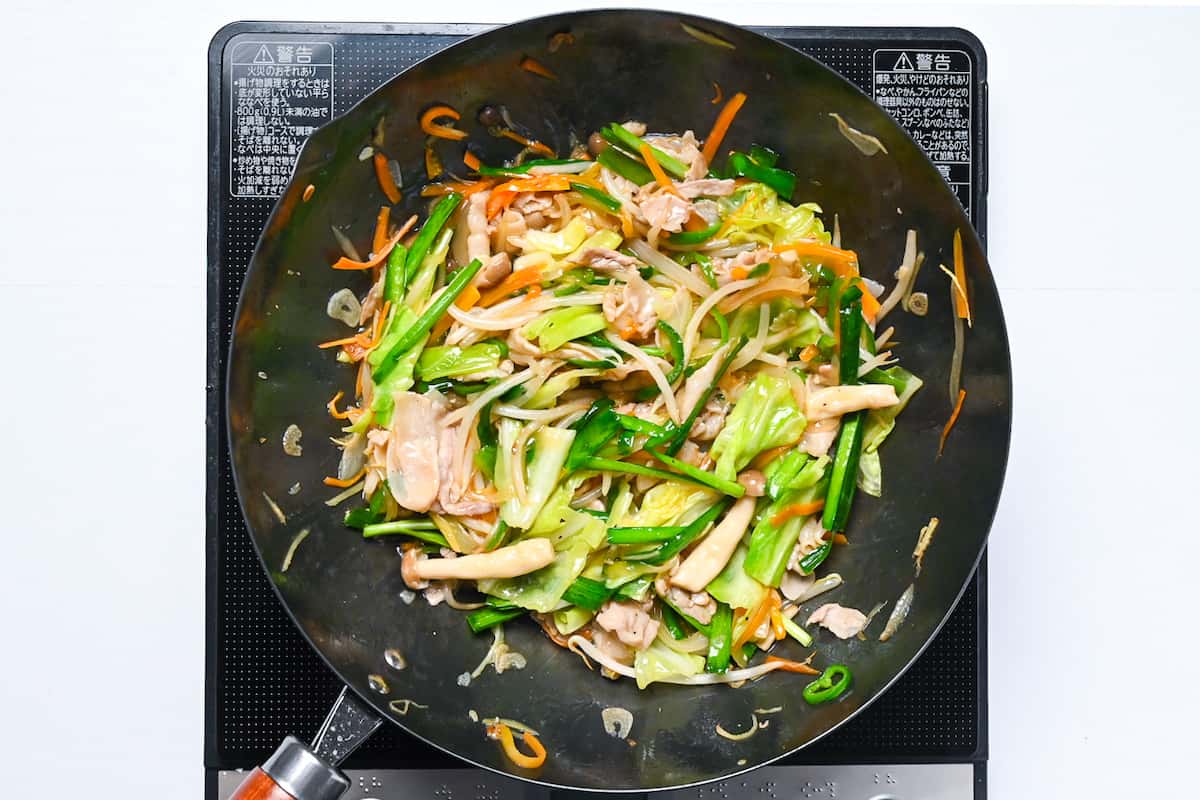
Once thickened, remove the pan from the heat.
Transfer the completed niku no yasai itame to serving plates.
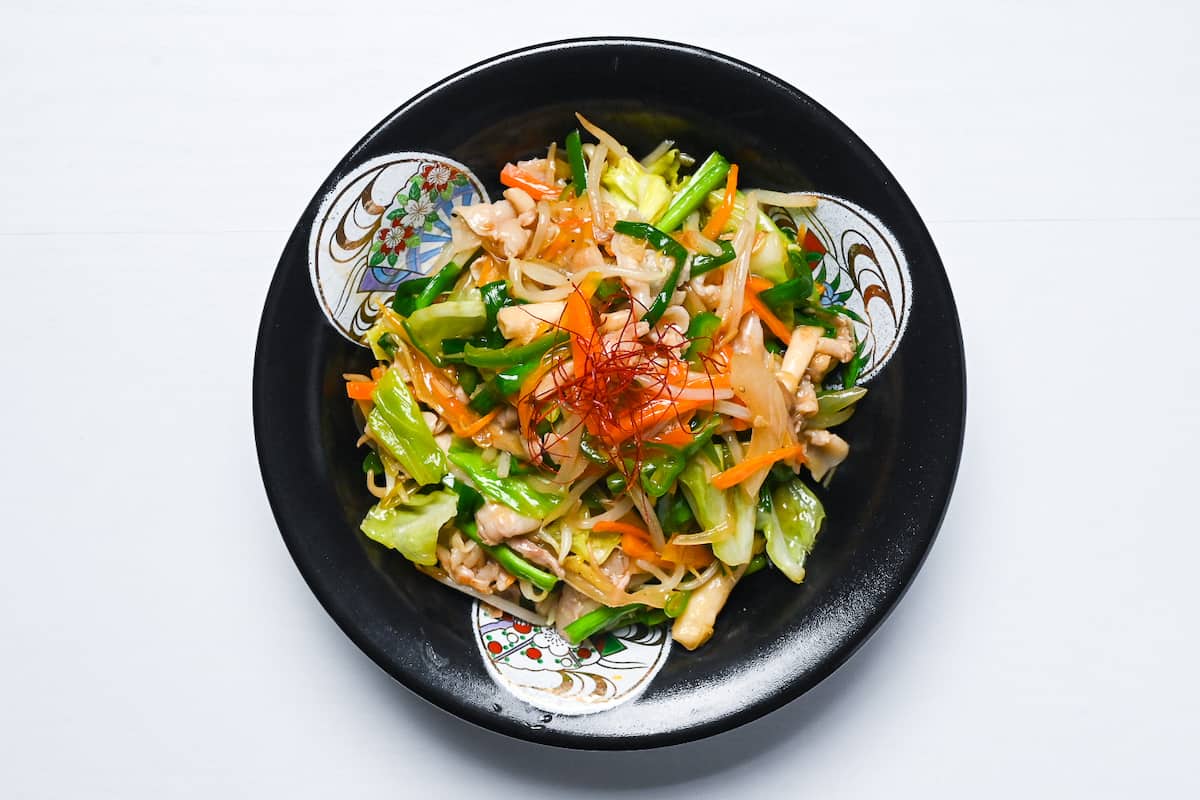
I like to add chili threads for a final touch. It adds a nice pop of color and a hint of heat for those who enjoy spicy foods.
I usually eat niku no yasai itame with rice, which also goes well with noodles!
Jump to Full Recipe Measurements
FAQ
Stir-fry became a popular cooking method in Japanese households during the 1950s and 1960s, particularly during the period of high economic growth. It gained popularity due to the affordability of cooking oil at the time, its ability to satisfy children’s big appetites by adding more vegetables and less meat at a low cost, and its quick and easy preparation. It is also highly customizable and a great way to use leftovers. As a result, yasai itame has become one of the most widely cooked home recipes in Japan.
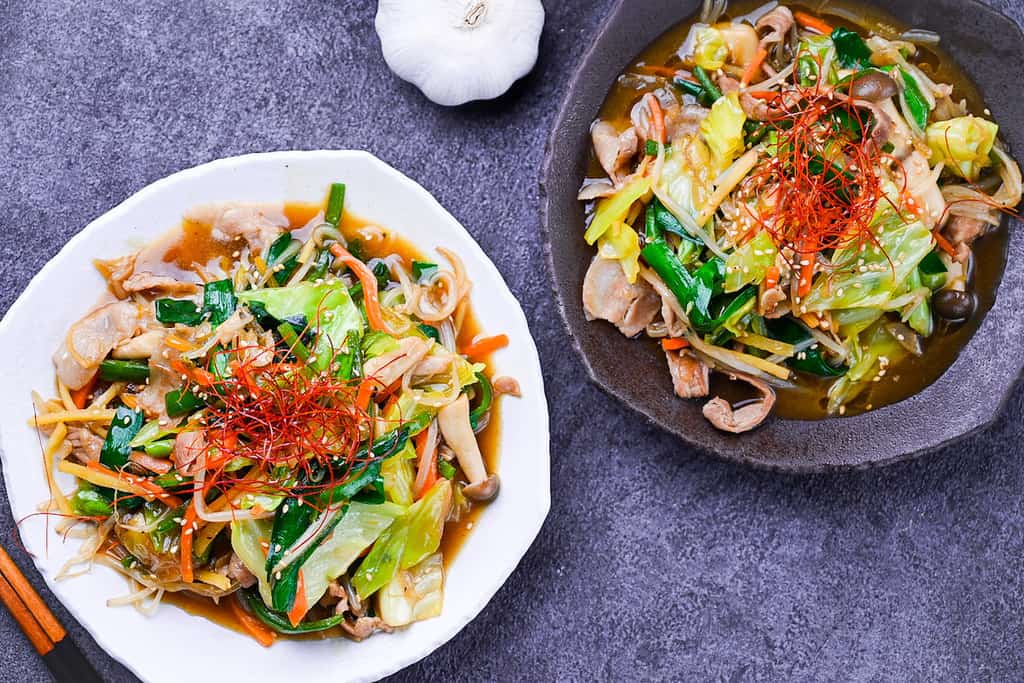
I hope you enjoy this Niku Yasai Itame recipe! If you try it out, I’d really appreciate it if you could spare a moment to let me know what you thought by giving a review and star rating in the comments below. It’s also helpful to share any adjustments you made to the recipe with our other readers. Thank you!
More Quick Lunch Recipes
- Sukiya Gyudon (Japanese Beef Bowl)
- Quick & Easy Yakiniku Don (Japanese BBQ Style Beef Bowl)
- Easy and Delicious Ponzu Chicken
- Okinawa Taco Rice And Cheese (Cafe Style)
- Tamago Sando (Japanese-Style Egg Sandwich)
Want more inspiration? Explore my Japanese Lunch Recipe Roundup Post for a carefully selected collection of tasty recipe ideas to spark your next meal!
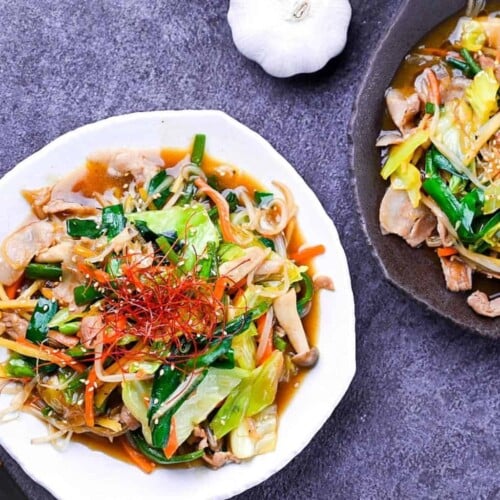
Buta Yasai Itame (Japanese Vegetable Stir Fry with Pork)
Equipment
Ingredients
- 1 tsp cooking oil
- 100 g thinly sliced pork belly
- 1 pinch salt and pepper
- 2 cloves garlic thinly sliced
- 15 g ginger root julienned
- 50 g carrot peeled and julienned
- 50 g onion thinly sliced
- 50 g shimeji mushrooms or any sliced mushroom of your choice
- 100 g green cabbage roughly chopped
- 50 g bell pepper thinly sliced
- 100 g bean sprouts
- 30 g garlic chive(s) cut to 5cm in length
Sauce
- 1 tsp Chinese-style chicken bouillon powder
- 100 ml hot water
- 2 tsp oyster sauce
- 1 tsp Japanese soy sauce (koikuchi shoyu)
- ½ tsp salt
- 2 tsp sugar
- 1 tbsp cold water to make slurry
- 1 tbsp potato starch (katakuriko) or cornstarch, to make slurry
Garnish (optional)
- 1 tsp toasted sesame oil
- 1 tbsp toasted white sesame seeds
- 1 tsp chili threads
My recommended brands of ingredients and seasonings can be found in my Japanese pantry guide.
Can’t find certain Japanese ingredients? See my substitution guide here.
Instructions
- Heat a wok on medium and add 1 tsp cooking oil. Once hot, add 100 g thinly sliced pork belly and sprinkle with 1 pinch salt and pepper. Add the sliced 2 cloves garlic and fry together until pork is sealed.

- Once the pork is sealed, add 15 g ginger root, 50 g carrot, 50 g onion and 50 g shimeji mushrooms and stir fry for a few minutes or until softened slightly.

- Next add 100 g green cabbage and 50 g bell pepper, stir fry for a minute or two.

- Add 100 g bean sprouts and stir fry for another minute.

- Mix 1 tsp Chinese-style chicken bouillon powder and 100 ml hot water together in a jug and then pour it into the wok along with 2 tsp oyster sauce, 1 tsp Japanese soy sauce (koikuchi shoyu), ½ tsp salt and 2 tsp sugar.

- Add 30 g garlic chive(s) and mix.

- Make the slurry in a small bowl with 1 tbsp cold water and 1 tbsp potato starch (katakuriko). Pour it into the wok and mix well.

- Once the sauce is thickened, remove from the heat and dish up.

- Drizzle with 1 tsp toasted sesame oil for finishing touch and garnish with 1 tbsp toasted white sesame seeds or 1 tsp chili threads. (Optional.)

- Enjoy with rice or noodles!

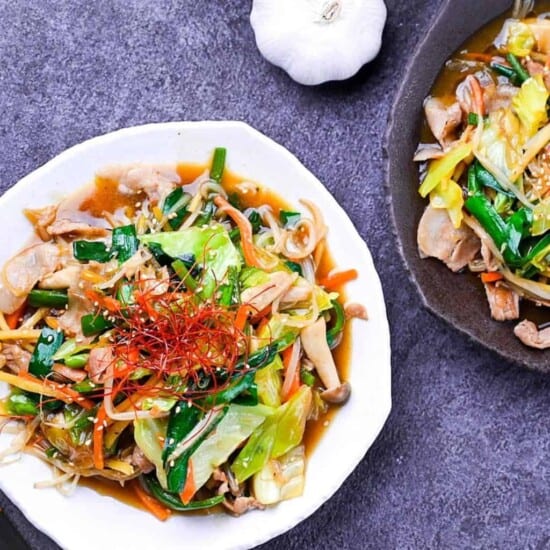



Leave a rating and a comment